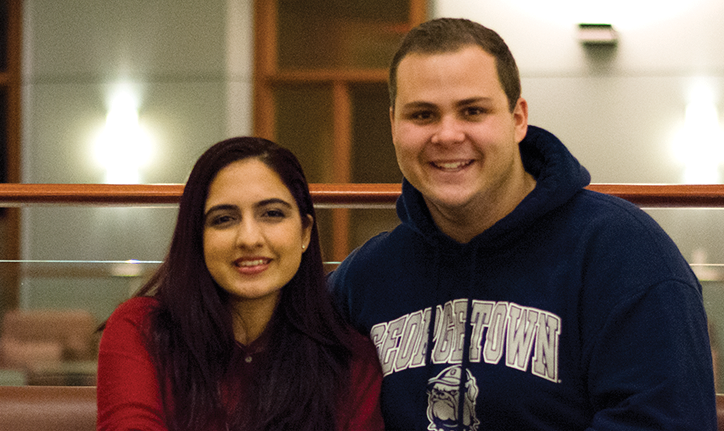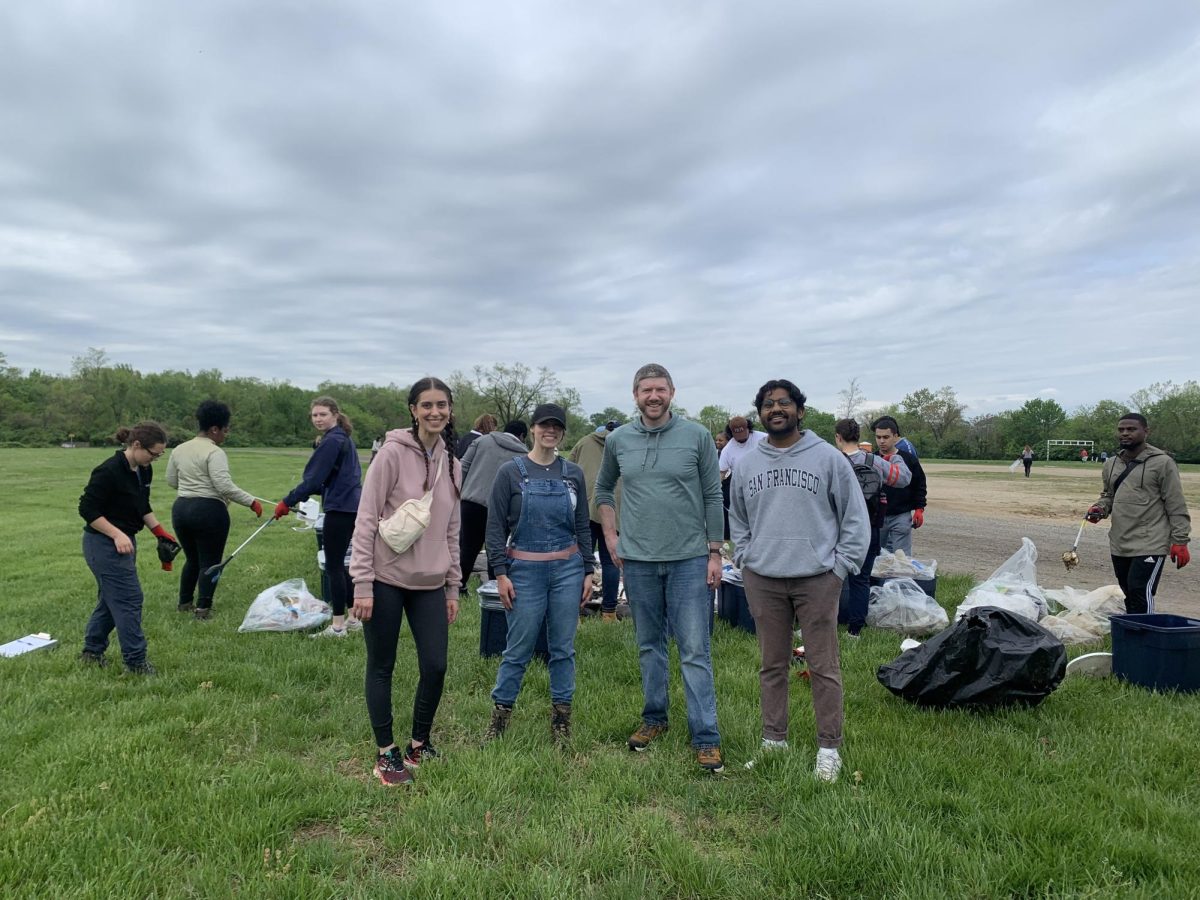
Former GUSA President Enushe Khan (MSB ’17) and Vice President Chris Fisk (COL ’17) cited dining and outreach to minority groups as their primary achievements.
Former Georgetown University Student Association President Enushe Khan (MSB ’17) and Vice President Chris Fisk (COL ’17) entered office 373 days ago on a campaign platform of creating a more inclusive GUSA, reforming dining and completing the 2036 campus plan.
The Khan-Fisk administration had the largest GUSA executive in recent history, with over 200 members, after restructuring the executive in March to create policy teams, which advocate on issue areas in conjunction with the senate.
The term saw a series of successes in dining and campus planning. In September, the university, residents and GUSA signed a 20-year campus plan that pledged renovations to campus residence halls, and in November, the university signed a new 10-year dining contract with Aramark.
A week after leaving office, Khan and Fisk discussed their proudest accomplishments, the path to creating a more diverse and inclusive GUSA and what they took away from their experience.
This interview has been edited for length and clarity.
What are you most proud of from your term, as a collective administration and as individuals?
Khan: What I am personally most proud of our term is the fact that the new way that we chose to run our administration allowed for different people, who traditionally would not be involved in GUSA, to play a part and be able to be in the room and make important policy changes. That is something I am really proud of, that this long list of accomplishments is reflective of a different way of engagement of administration and our being able to work with students from across campus and bring them in the room. That has a lot to do with restructuring, but also our trying to reach out to students: ‘We feel like this is your issue area, we want you in the room to speak on behalf of it.’
Fisk: The biggest personal takeaway is understanding what really constitutes leadership. That’s supporting and empowering and respecting people, because if that’s what you’re building — relationships — then everyone has room to be themselves and succeed versus kind of fighting for the limelight or power, so supporting and empowering people as the definition of leadership for me has been the biggest personal takeaway for me.
What are your biggest regrets from your term, as a collective administration and as individuals?
Khan: We would both agree that our shortcoming was something every GUSA administration has struggled with: communicating to the student body, because the general student doesn’t recognize that all this great work happened this year, and people associate GUSA with self-serving individuals who just talk but don’t actually get anything done. But this was really a year, and I am not even talking about me and Chris. There were individuals who genuinely were working day and night to make real changes happen that the student body does not associate with GUSA. There are great things happening that are impacting their daily lives, but they don’t know it was because of GUSA. That’s a struggle, because obviously we wish we communicated it better, but on the other hand, it’s tough to balance why you are doing this work in a way that’s not to make yourself look better and say look what we did, and balancing that with genuinely wanting people’s days to be better even if people don’t know we did it.
What do you see as your legacy?
Khan: Food might be associated with our administration just because it is something that GUSA did not focus on as much as it could have in past years. When it comes to smaller, under-represented communities like undocumented students, Muslim students, students of color, LGBTQ students, students in [Georgetown Scholarship Program] for example, they are communities that are not traditionally heard. I hope they will associate our administration as one that vouched for them after years of not being vouched for.
What were your biggest surprises during your term? How do you think you handled them?
Khan: November’s election was the biggest surprise, because when we ran there were obviously issues that were connected to things that we have advocated for before November, but not to the extent we have since November. We didn’t foresee the impact of federal action on students on our campus. We realized that, shoot, this does change a lot of what we have to work on this year, and suddenly we found ourselves diving even more into those issues of inclusivity. How do we make sure our marginalized populations and vulnerable and literally unsafe populations are getting the resources that they need and beyond a, ‘You can come into this room and talk to this person,’ but rather ‘OK, this person needs legal services. Are you going to provide them for free? Are you going to provide housing if they can’t go home?’
These are all things we did behind closed doors, because the nature of this is something that should not be on Breitbart but rather things that we recognize should be internal conversations. We could protect those students before anything else. That is something that again we had to give up the communication part to make sure that people were literally safe.
How would you define your success in your campaign pillars of dining, campus planning and inclusivity?
Fisk: It is an objective fact for us to say that because of GUSA’s work this year, Georgetown is a more accessible and easier place to navigate for students from different socio-economic backgrounds, specifically students from under-privilleged backgrounds. From winter-break housing and shuttles to laundry conversations that are happening right now to printing agreements with UIS to establishing an advisory board for affordability and access that will have over 40 students and administrators and faculty members that are tackling these issues going forward. There is just so much in that portfolio and you can look at it in the final report as well that contributes in pretty traceable amounts of money in a number of them to providing a benefit to students from less privelleged socio-economic backgrounds. I think it was a huge priority for us and something that at the end of the day we can say was a pretty darn big success.
What is the biggest challenge GUSA President Kamar Mack and Vice President Jessica Andino face entering office and the biggest thing they have working in their favor?
Khan: One advantage is the structure. They’ve inherited a structure that clearly worked, if you ask us, and based on how the senate voted, they tended to agree with that. They’re inheriting a really good structure that will allow for this to be continued. It has institutionalized other voices being in the room, which is why we’re really happy with the structure that we have. They will inherit relationships that GUSA has built and strengthened over this past year that either did not exist before or were very weak in the past.
Jessica was a member of the cabinet, and has experience working through an issue area that succeeded. Her having an understanding of the structure also helps there. In terms of things that they will have to struggle with and work through, it’s a bigger GUSA now, having to work with more people and having to be patient because there are going to be different opinions and there are going to be clashing opinions. We had a positive relationship with the senate, but because the senate is still trying to figure out what they are and what their purpose is on campus, I could foresee there being some tension, similar to how there was in past years.
You had one of the largest GUSA executive branches in recent memory with the new policy teams. Did they prove effective? What is the right way to create a more inclusive and diverse GUSA?
Fisk: When we were underclassmen, GUSA was an exclusive nebulous group of people. You didn’t know what they did, and you were pretty darn sure there were like 10 people in there. If you weren’t friends with someone who was in GUSA, you had a hard time participating in that process. By making it so that any student can contribute, offer their thoughts and ideas, it becomes a more effective body, and it becomes a body that is better able to advocate for students, because it has a more streamlined process of getting their feedback and getting their contributions. We are maybe biased, but by making it easier for students to contribute, you’re making a more diversified GUSA. You’re making a GUSA that advocates on behalf of the most students of very different backgrounds.
What are your plans for after Georgetown?
Khan: So I am hopefully going to be in New York at Goldman Sachs. I’ve switched over to the investment banking side from merchant banking, which is where I was this summer.
Fisk: I’ll be doing Teach for America in Miami-Dade, in the community that was so important in getting me here. I’ll be working on getting a master’s at the same time.
How has GUSA influenced you personally over the last year?
Khan: I’ve learned what it means to be a leader and to be empathetic, especially this year, having to be in the position that I was, learning about what the needs of others are with no prejudgment, with no personal stake, with no, ‘This is what I think you want so therefore this is what you should want.’ But being sensitive to people’s issues and taking them as seriously as they feel they are, and really feeling their pains and frustrations, and using that as fuel to get things done.
In the process, I learned about empathy and understanding other people’s experiences that maybe don’t apply to me, but recognizing that they are just as valid. Empathy has been a big part of it. On the leadership side, I learned what it means to be a woman in leadership and how my gender has influenced my own style of leadership, and how I’ve tried to change certain things and recognizing the gender factor, the color factor, all of that. To all of that, I’ve personally learned that empowering other people is an incredibly effective way of leadership and being humble and recognizing that you don’t know everything is crucial to outcome.
Fisk: One, leadership isn’t a zero sum game, and by that I mean if someone knows more than you, if someone is better at something than you are, that doesn’t mean that you’re deficient, it means that it’s an opportunity for you to allow them to step up and take the lead on something.




















